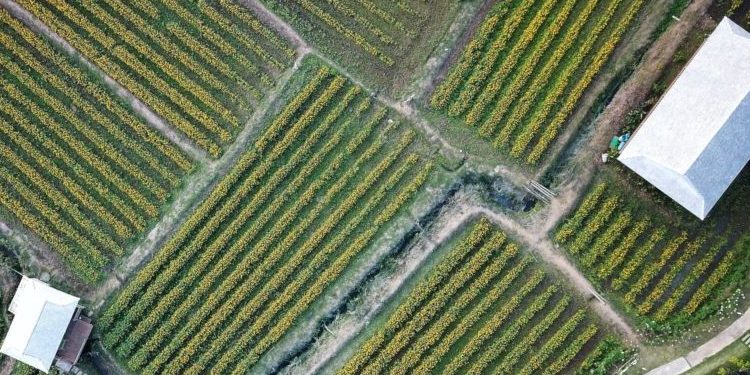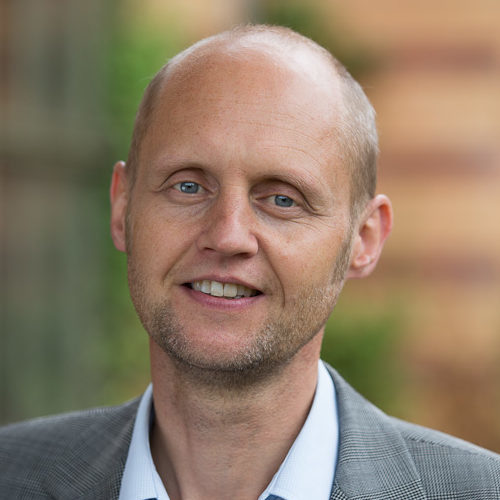Possible Futures
Hermann Lotze-Campen models agricultural-scenarios

From part-time worker to the head of a research domain
After finishing his studies and PhD, the native East Frisian initially turned his back on science and started a career in industry and self-employment working with a space company for satellite services and as agricultural consultant. In 2001 Hermann Lotze-Campen joined PIK where he was looking for a part time position parallel to his consultancy work – he found a 50 % position, fixed for one year. By now, 16 years later, he is chair of one of the four PIK research domains and has more than a 100 employees doing research on “Climate Impacts and Vulnerabilities”. “Because of the interdisciplinary environment and the new perspectives on agriculture I became interested in science again,” the agricultural economist remembers. Suddenly, environmental questions were addressed, namely in cooperation with physicists, hydrologists or ecologists. The focus of Lotze-Campen’s own research group lies on agriculture and land use, two aspects are especially important for his team: Firstly, what consequences does climate change has on agriculture? And secondly, how does agriculture itself contribute to climate change?
Gaining orientation for the future with experimental games
Lotze-Campen finds answers in computer models, as computer simulations are the main research instruments at PIK in order to create future scenarios. In his agricultural models he and his team calculate under which climatic conditions harvest will fail, meaning how much food and biomass is produced in specific regions or around the world. “In a yield model you put in temperature and precipitation, and in the end the wheat yield comes out,“ the scientists states. Although it sounds so easy, the research is based on carefully developed mathematical formulae and requires a huge amount of data which are fed to the computers. Those data, for instance statistics, test series and satellite images, come from external sources, and in the end the models deliver timelines, bar diagrams and maps and will be checked with already known developments from the past. Lotze-Campen cannot forecast the future with them, but such experimental games and scenario analysis provide orientation – for example, what awaits us if we continue to drive climate change with our way of living and economic system?
Challenges for agriculture
What happens to agriculture in the face of climate change? There are indeed regions that could benefit from global warming. With rising temperatures it might be possible that crop yields will increase in colder areas of Scandinavia and North-Russia, but worldwide the yield losses would be enormous. “Especially in tropical areas we are often already at the limits of physiologically acceptable temperatures,” the expert says. Lotze-Campen assumes that increasing extremes such as droughts and heavy rainfalls will complicate growing conditions on the fields, and in a worst case scenario agriculture might even come to an end in some areas.
At the same time agriculture plays an increased role in the mitigation of emissions. Just two years ago the international community decided at the UN-Climate Change Conference (COP-21) in Paris to limit global warming to a maximum of 2 degrees above the pre-industrial level. “On a long term basis those goals are so ambitious that besides wind and solar energy more bio-energy is needed. And this is a big challenge for agriculture,” Lotze-Campen states. The cultivation of energy crops however constitutes a competition with the cultivation of food products. That is why at PIK the experts for energy and agriculture are working closely together. “From time to time, colleagues come by asking for a certain amount of biomass for their energy scenarios. Than we say, you can have biomass, but this will also cost a certain amount of money due to land use or new research. If that is too expensive they might go for more solar energy in their model.” That is how the researcher describes the joint quest for a workable compromise. Whether agricultural land will be sufficient for food and fuel at the same time is a question of increasing productivity and its limits according to Lotze-Campen. “When we look into the past we see an increase of productivity due to crop breeding and new cultivation methods. But the future development is unsure.” Because there are no easy answers, Lotze-Campen hopes for a bundle of measures including technological innovations, political agenda setting, changes in eating habits and, if necessary, also including special relocation of production facilities along with altered trading routes. Altogether, scientists still have a lot of work ahead in order to create scenarios that work in all directions.
Integrated assessment helps with complex questions
To bring knowledge from various disciplines together is the determining approach in modelling at PIK. Here not only agricultural models are developed, but also models for the economy, the water budget, the climate or the energy systems. In the so called integrated assessment those models are combined, e.g. by using the output data of one model as input data for the next one or by developing new integrated models. For example, economic models identify the greenhouse gas emissions of a given scenario and its economic and population growth, energy consumption and transport volumes – those framework conditions that are crucial for the sustainability or non-sustainability of a society. For their part, the calculated emission values provide an important basis for climate models which deliver reliable outcomes for global warming. Those outcomes are, in turn, part of Lotze-Campen’s calculations for crop yields and land use. “It’s a closed circle,” explains the researcher the approach across disciplines. “Luckily, what helps us is the common language of mathematics on which all these models are based.” The necessity of a common language in order to bring disciplines together is also part of Lotze-Campen’s experience at IRI THESys.
Contact

Hermann Lotze-Campen
Email:
At the Potsdam Institute for Climate Impact Research (PIK) the agricultural economist Hermann Lotze-Campen models agricultural scenarios for agriculture under the conditions of climate change. Above all, he is interested in a holistic approach which requires a constant exchange with his colleagues from other disciplines.


